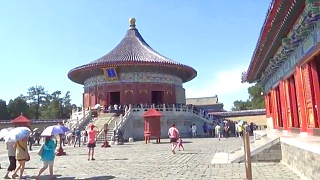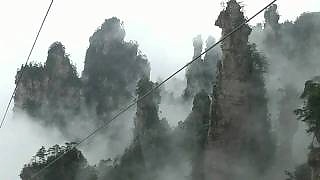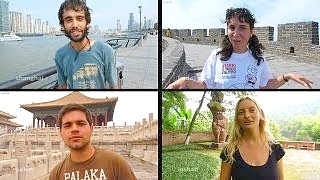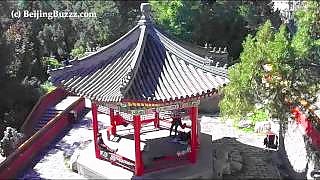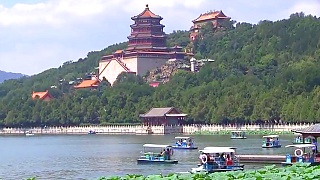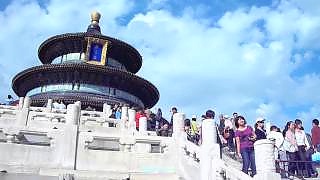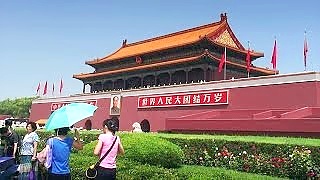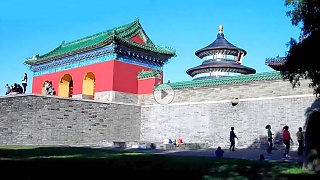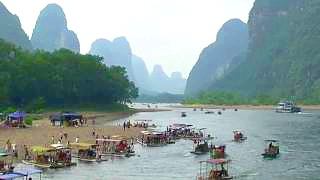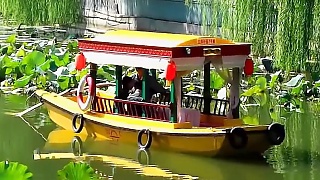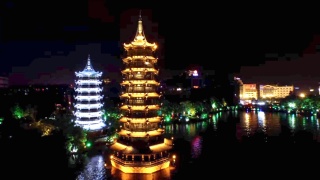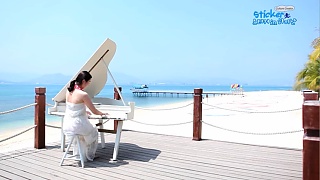With Beijing Old Liu ...
[640],shadow=true,start=,stop=Welcome to the Temple of Heaven
Explore the ancient beauty and cultural significance of the Temple of Heaven in Beijing.
Introduction
The Temple of Heaven is a complex of religious buildings situated in the southeastern part of central Beijing. It is renowned for its architectural beauty and historical significance.
Location
The Temple of Heaven is located in the Dongcheng District of Beijing, easily accessible from various parts of the city.
History
The Temple of Heaven was constructed from 1406 to 1420 during the reign of the Yongle Emperor, who also oversaw the construction of the Forbidden City. The temple complex was used by the emperors of the Ming and Qing dynasties for annual ceremonies of prayer to Heaven for a good harvest.
The temple complex was expanded and renovated during the reign of the Jiajing Emperor in the 16th century and again during the reign of the Qianlong Emperor in the 18th century. It was designated a UNESCO World Heritage Site in 1998.
Attractions
- Hall of Prayer for Good Harvests: The iconic triple-gabled circular building, used by emperors to pray for good harvests.
- Imperial Vault of Heaven: A circular building surrounded by a smooth circular wall, famous for its Echo Wall.
- Circular Mound Altar: An open-air altar platform where the emperor would worship Heaven during the winter solstice.
- Seven Star Stones: A group of large stones with historical and cultural significance.
- Ancient Cypress Trees: The garden areas of the complex are home to many ancient cypress trees, some over 600 years old.
Activities
- Historical Tours
- Cultural Performances
- Photography
- Guided Walks
- Seasonal Festivals and Events
Facilities
- Visitor Center
- Restrooms
- Gift Shops
- Cafes and Restaurants
- Parking Lots
- Wheelchair Access
Visitor Tips
- Wear comfortable walking shoes.
- Bring water and snacks, especially if you plan to stay for several hours.
- Visit early in the morning or late in the afternoon to avoid crowds.
- Check the weather forecast and dress appropriately.
- Respect the cultural significance of the site; behave appropriately and follow all rules and guidelines.
Beijing, the capital city of China, is a vibrant metropolis steeped in history, culture, and modernity. Here's a brief overview of what you can expect as a tourist in Beijing:
Historical Landmarks:
The Great Wall of China: One of the most iconic structures in the world, the Great Wall is easily accessible from Beijing. Mutianyu and Badaling sections are popular among tourists.
Forbidden City (Palace Museum): A UNESCO World Heritage Site, this vast imperial palace complex was home to Chinese emperors for over 500 years. It houses numerous halls, courtyards, and historical artifacts.
Temple of Heaven: A masterpiece of Chinese architecture, this ancient temple complex served as a place of worship for emperors to pray for good harvests.
Summer Palace: A stunning ensemble of lakes, gardens, and palaces, the Summer Palace served as a retreat for emperors during the Qing dynasty.
Tiananmen Square: One of the largest city squares in the world, Tiananmen Square is flanked by important landmarks such as the Monument to the People's Heroes, the Great Hall of the People, and the Mausoleum of Mao Zedong.
Cultural Sites:
Beijing Hutongs: Explore the narrow alleyways and traditional courtyard residences of Beijing's historic neighborhoods. You can take a rickshaw tour or simply wander around on foot.
Beijing Opera: Experience traditional Chinese opera performances at venues like the Liyuan Theater or the Chang'an Grand Theatre.
798 Art District: A hub of contemporary art and culture, this former industrial area is now home to numerous galleries, studios, and cafes.
Modern Attractions:
Olympic Park: Visit iconic structures such as the Bird's Nest (National Stadium) and the Water Cube (National Aquatics Center) from the 2008 Beijing Olympics.
CBD (Central Business District): Marvel at the futuristic skyline of Beijing's modern business district, which includes landmarks like the CCTV Headquarters and the China World Trade Center Tower III.
Culinary Delights:
Peking Duck: Indulge in Beijing's most famous dish, crispy roast duck served with pancakes, scallions, and hoisin sauce.
Street Food: Explore the city's vibrant street food scene and sample local delicacies like jianbing (savory crepes), lamb skewers, and dumplings.
Practical Tips:
Transportation: Beijing has an extensive public transportation system, including the subway, buses, and taxis. However, traffic can be heavy, so plan your travels accordingly.
Language: While English is not widely spoken, especially outside tourist areas, many signs and transportation announcements are in English. It's helpful to carry a translation app or a phrasebook.
Weather: Beijing experiences four distinct seasons, with hot summers and cold winters. The best times to visit are spring (April to June) and autumn (September to October) when the weather is mild and comfortable.
Etiquette: Respect local customs and traditions, such as removing your shoes before entering someone's home and using both hands to pass or receive items.
Beijing offers a rich tapestry of experiences for tourists, blending ancient heritage with modern innovations. Whether you're fascinated by history, culture, or culinary delights, there's something for everyone in this dynamic city.
 The beautiful Temple of Heaven, BeiJing
The beautiful Temple of Heaven, BeiJing
